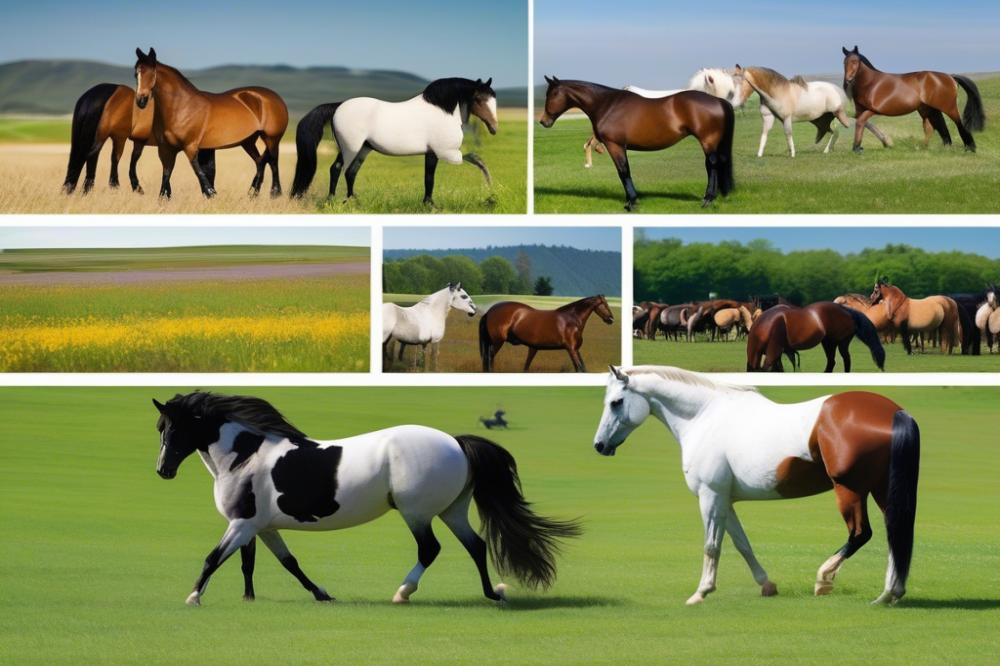Understanding equine temperament: How Personality Affects well-being
equine temperament refers to the general nature and disposition of a horse. It encompasses their behavioral tendencies, emotional reactions, and overall disposition. Knowing a horse’s personality is vital in promoting their health and happiness. When handlers comprehend these traits, they can better meet the needs of each horse. This understanding serves as a bridge between the animal and its caretaker.
Every horse has a distinct way of reacting to its environment. Some may be calm and steady, while others might be more spirited or anxious. Recognizing these differences is essential for effective communication. For instance, a nervous horse might require a gentler approach. Understanding how to interact with a well-being“>horse personality affects everything from handling to training methods.
The right approach can lead to improvements in behavior and overall well-being. When horses feel understood, they are less likely to display stress-related behaviors. Happy horses tend to have better health and performance levels. By learning to identify and respond to an individual horse’s temperament, handlers can foster a positive relationship. This connection enriches the experience for both the animal and the caretaker.
Observing how a horse reacts in various situations offers insights into its temperament. Changes in mood or behavior often signal specific needs. Addressing these needs promptly can enhance the quality of life for a horse. In conclusion, understanding equine temperament is not just about managing behavior; it is a crucial aspect of caring for the animal as a whole. Through this knowledge, handlers can create an environment that nurtures health and happiness.
Understanding Equine Temperament

Equine temperament refers to the individual personality traits found in horses. Just like humans, each horse has a distinct way of responding to situations. Some are calm and easygoing, while others may be more spirited and energetic. Identifying these traits can significantly impact their overall happiness and health.
Horses can display various personality characteristics. Some might be curious and adventurous, eager to explore their surroundings. Others could be more cautious, preferring a predictable environment. Aggressive behavior is also seen in some horses. These traits often dictate how a horse interacts with its handler and other animals.
The influence of personality on well-being cannot be overlooked. A horse that is naturally anxious may struggle in stressful environments. For such animals, a routine can offer stability. Meanwhile, outgoing horses may thrive on interaction and stimulation. Understanding these differences can help caretakers create better living conditions.
Management strategies must consider each horse’s temperament. For example, an easily spooked horse might need a quieter, less chaotic space. On the other hand, lively horses can benefit from more activities and socialization. Adjusting care can lead to happier, healthier animals.
Training approaches can also shift based on personality types. More sensitive horses may respond best to gentle methods. Those with a feisty nature could require stronger leadership and consistency. Recognizing how a horse’s traits affect its learning process is essential for effective training.
Fostering a positive environment that respects each horse’s individuality can enhance their happiness. Owners and trainers should remain observant and patient. Change can take time, but understanding temperament will ultimately lead to a stronger bond.
The Impact of Temperament on Health and Well-Being

Temperament plays a vital role in a horse’s overall health. Each horse responds differently to their environment based on personality traits. For instance, a skittish animal may develop stress-related issues due to fear. They are often more susceptible to physical conditions like ulcers. This is largely caused by the tension that results from anxiety.
A calm horse, in contrast, tends to adapt better to various situations. Such animals often face fewer health problems. This adaptability can translate into a more robust immune system. Stress can weaken a horse’s ability to fend off illness. Consequently, personality types that are more easily stressed may require additional care. Regular routines and a stable environment can aid in reducing anxiety.
Behavior also affects emotional well-being. Horses with aggressive tendencies may suffer from chronic tension. This often leads to issues such as colic or behavioral difficulties. In some cases, these animals may find it challenging to build strong relationships with humans. Relationships play an essential role. Positive interactions can promote better emotional health.
The setting in which a horse lives is equally important. An environment with plenty of space tends to promote happiness. Isolation can lead to depression, especially in social animals. When a horse has companionship, both physical and emotional health improve. Moreover, offering mental stimulation through varied activities can enhance their quality of life.
It’s crucial to monitor signs of stress related to temperament. Changes in appetite, posture, or social behavior can indicate underlying issues. Addressing these concerns swiftly can prevent more serious health problems. Each horse requires an approach tailored to its unique needs. Understanding how personality traits affect a horse’s overall well-being can improve quality of care.
Owners play a significant part in this equation. Creating a supportive environment is key to keeping horses content. Incorporating consistent routines helps minimize stress. Ensuring social interaction with other horses is also beneficial. Finally, providing a safe and enriching space will contribute greatly to their health and happiness.
Behavior and Training Considerations
Training a horse requires more than just techniques; it needs an understanding of how different personalities respond to various approaches. Some horses react better to gentle guidance, while others may respond to a firmer hand. Recognizing these differences can greatly impact the training outcome.
Tailored strategies are essential for successful training. A skittish horse may become overwhelmed with loud commands or sudden movements. Instead, using soft voices and slow movements can create a more manageable environment. On the other hand, an energetic horse might thrive on challenges. Providing varied activities can keep them engaged and focused. Observing these individual traits helps trainers adapt and refine their methods.
Stress plays a critical role in horse training. Elevated anxiety levels can hinder progress, making it difficult for the animal to learn. It is important to identify stress triggers, such as loud noises or crowded spaces. Reducing these stressors can lead to a more positive training experience. Additionally, incorporating breaks and rewards often helps in building a trusting relationship between horse and trainer.
Understanding each animal’s temperament can lead to more effective training sessions. Patience is key. Horses that require more time can frustrate trainers or owners who expect quick results. Adapting the pace to match the horse’s learning style fosters a healthier environment. Furthermore, consistent routines provide comfort for animals, easing anxiety and facilitating learning.
Overall, a responsive approach to training enhances the horse’s well-being. Trainers should aim to cultivate a bond built on trust. When horses feel secure, they are more likely to embrace learning and develop new skills. Tailoring techniques to match the animal’s personality will create a better training atmosphere. This understanding can build lasting relationships that transcend basic training.
Social Interaction and Bonding
Temperament plays a significant role in how horses interact with each other and with humans. Some horses are naturally more social and outgoing. These animals tend to form bonds quickly with their peers. Others may be more reserved, preferring to observe before joining groups or activities. Understanding this diversity is key to fostering healthy relationships.
Bonding is crucial in every aspect of a horse’s life. Strong connections with handlers can lead to improved trust. Horses that feel safe are more likely to cooperate. Relationships with other horses also matter. A well-bonded herd can decrease stress and promote overall well-being. It is essential to observe how individual horses interact within a group.
Handlers can strengthen relationships by adjusting their approach based on the horse’s personality. For instance, a timid horse may need gentle encouragement. Providing a calm environment helps such horses feel more at ease. On the other hand, a confident mare might thrive on playful interaction and challenges. Recognizing these traits can guide handlers in their training practices.
Trust-building exercises can be effective tools. Simple activities like grooming can enhance feelings of security. Spending time with a horse while talking softly might also encourage bonding. Every horse reacts differently, so patience is essential. Handlers should be aware of body language, as it often reveals a horse’s comfort level.
Creating a routine can also enhance social interactions. Regular feeding and handling times establish predictability. This reliability helps horses understand what to expect, reducing anxiety. Engaging in various activities together, such as trail rides or obstacles, builds teamwork. Each experience fosters a deeper connection.
Finally, recognizing and respecting a horse’s unique character leads to more meaningful interactions. Some horses may take longer to develop bonds than others. It’s important to approach relationships with empathy and understanding. Over time, the connection between a horse and its handler deepens, improving overall happiness and stability.
Environment and Care Best Practices
The setting in which a horse lives plays a significant role in shaping its temperament. Factors like space, noise, and companionship can deeply influence how a horse behaves and feels. For instance, a horse in a calm and spacious environment tends to be more relaxed and open to interaction. Conversely, if a horse is kept in a crowded or loud area, stress levels may rise, leading to anxiety or aggression.
When caring for horses, it is crucial to consider their personalities. A shy horse may require a quieter, less stimulating area. Provide shelter that is away from constant human activity or loud noises. These horses benefit from minimal disruptions, allowing them to feel safe and secure.
On the other hand, more outgoing horses thrive in social settings. They enjoy interaction with both other horses and humans. Ensure they have access to companions and plenty of room to roam. This environment helps maintain their happiness and health.
Daily routines also play a role. Consistency is important in a horse’s life. For those with sensitive tempers, keeping feeding and exercise patterns stable can boost their comfort. A structured environment reduces anxiety and promotes a sense of stability.
For playful or active horses, incorporating engaging activities is beneficial. Interactive toys or safe agility challenges can provide mental stimulation. Engaging their minds can reduce boredom and encourage positive behaviors. Allowing time for play can help them release excess energy appropriately.
In addition to physical needs, emotional care matters. Monitor horses closely for signs of stress or discomfort. Providing gentle handling and positive reinforcement can foster trust. Different personalities require different approaches, but patience and understanding are key.
In summary, considering a horse’s environment is essential for its overall well-being. Tailoring care practices to match individual temperaments enhances their lives. Whether through a peaceful setting or engaging activities, creating supportive surroundings can lead to happier, healthier horses.
Communication Techniques for Different Temperaments
Understanding horse behavior is essential for establishing effective communication. Every horse has its own personality traits that influence how they respond to interactions. Observing body language and reactions can guide a handler in choosing the best methods for engagement.
For instance, some horses are naturally more curious and social. They may approach people eagerly, seeking connection. Engaging these horses can be done through gentle approaches, soothing voices, and treats. Creating a positive environment encourages their enthusiasm and builds trust.
On the other hand, there are horses that are shy or anxious. They might resist interaction, especially with new people. It is crucial to approach these animals slowly and quietly. Patience in these situations helps. Using soft tones and allowing the horse to come forward at its own pace can foster a sense of safety.
Horses that exhibit dominant behavior may require a different approach. These animals often test boundaries. Clear, consistent cues are important when interacting with them. Establishing authority and showing confidence can reduce potential behavioral issues. Groundwork exercises can enhance respect and communication.
Listening to a horse is as vital as speaking. Distinct behaviors, such as ear movement, tail position, and facial expressions, all convey messages. Taking time to learn these signs allows handlers to respond appropriately. This awareness makes every interaction more meaningful.
Establishing a routine can also improve understanding. Horses thrive on predictability, which helps reduce anxiety. A consistent schedule provides comfort and security. Engaging in regular activities also builds familiarity and strengthens the bond.
Utilizing non-verbal cues is an effective strategy as well. Horses are highly intuitive and often pick up on subtle body movements. Keeping your body relaxed and open can help convey a message of calmness. Avoiding sudden movements prevents alarm and promotes a positive interaction.
In summary, effective communication with horses depends on understanding their individual traits. Observational skills play a crucial role in tailoring interactions. With an empathetic approach, anyone can enhance their connection with horses, leading to improved overall well-being for both the animal and its handler.
Final Thoughts on Equine Temperament and Well-Being
Understanding the connections between a horse’s personality and its overall well-being is crucial for effective horse care. Each horse has its own set of traits that influences how it interacts with people and other animals. Recognizing these traits can lead to improved health and behavior.
For horse owners and caretakers, awareness of these differences is key. Personalities affect how horses respond to training and environmental changes. A gentle horse may need a different approach than a more spirited one. Tailoring care to fit individual needs fosters a better relationship.
Incorporating this knowledge into daily practices can benefit both the horse and the handler. Observing body language, vocalizations, and reactions can provide insights into a horse’s mood and comfort level. This proactive approach helps to minimize stress and promote mental well-being in these creatures.
Furthermore, a positive human-horse relationship is built on understanding and respect. By taking the time to learn about a horse’s temperament, owners can create a more nurturing environment. Ultimately, prioritizing the emotional and physical aspects of care leads to healthier and happier horses.
As you reflect on your own horse care practices, consider the importance of personality. Embracing these factors can improve the bond you share with your horse and enhance its quality of life.



